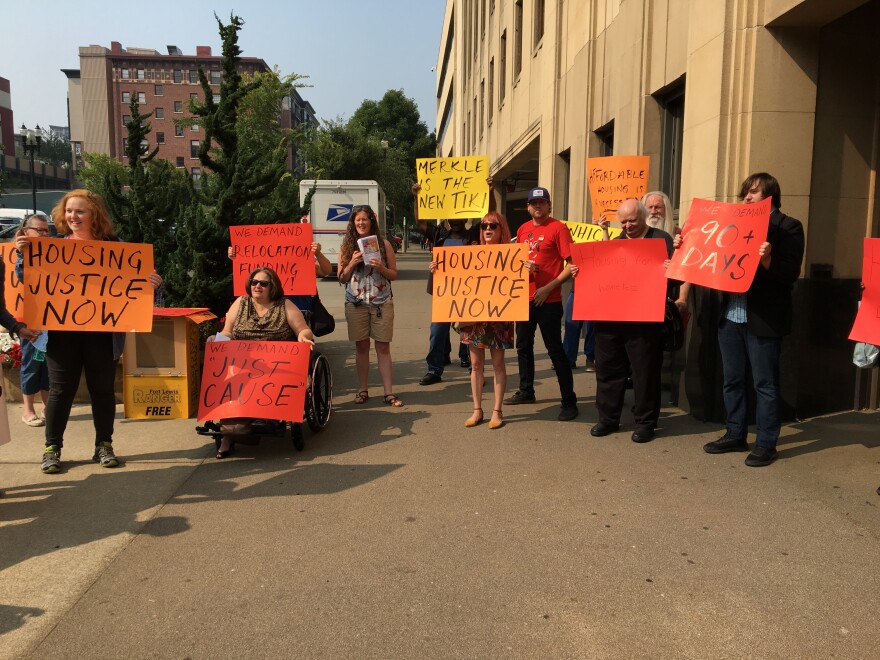Leaders in Tacoma are moving closer to passing a tenant-protection law designed to help renters weather upheavals in the city's housing market.
The law, as it's currently drafted, would give tenants more time to find a new home if they're forced to move for a variety of reasons, including a sharp rent hike or a renovation.
It would also make it easier for tenants to file claims of discrimination or retaliation by landlords in certain cases and require landlords to distribute information about tenants' legal rights.
A vote scheduled for Tuesday evening would extend emergency tenant protections passed earlier this year. City Council members hope to pass permanent regulations by the end of October.
Council Member Justin Camarata said the law will not solve Tacoma's recent housing woes, but is designed to provide stability to tenants swept up in an increasingly competitive market.
“It's getting more expensive to live here," Camarata said. "The amount of available stock is decreasing. And what’s happening is a lot of people at the lower end of the income spectrum are finding themselves in a difficult position."
Tacoma, not long ago considered a housing bargain in the Puget Sound area, has seen the region's fastest-rising rents and one of the nation's highest rates of gentrification, according to reports this year by Zillow and RentCafé.
Tacoma's leaders have been under pressure to overhaul the city's rental laws since April, when dozens of low-income tenants got notice of eviction by a new landlord from Seattle seeking to renovate their complex, known as the Tiki Apartments.
Some tenants had less than a month to move before City Council members intervened and negotiated an extension with the landlord.
The episode highlighted the extent to which Tacoma's efforts to protect renters lag behind those in other cities such as Seattle.
It also sparked activism around housing in Tacoma. Tenants began showing up at City Council meetings to share the obstacles they faced as they searched for new apartments and tried to stave off homelessness.
The proposed rental law does not include one item demanded by activists: a "just cause" ordinance preventing landlords from arbitrarily ending month-to-month rental agreements.
A just cause law creates a list of approved reasons for terminating a month-to-month arrangement. In Seattle, which has had such a law since 1980, those reasons include a tenant failing to pay rent or failing to follow the rental agreement.
Tacoma council members and staff said they feared a just cause law would be too sudden and could have unintended consequences in the rental market.
“We needed more time to understand what that could look like within the City of Tacoma and how we could do it in a way that did not cause harm to the rental market and the stock of available housing, particularly on the lower end of the income spectrum," Camarata said.
City leaders convened a panel of tenants and landlords to help shape the law.
“We’re trying to just protect housing in Tacoma, and we are aware that that effects both property owners and the tenants," said ChiQuata Elder, the city's landlord-tenant coordinator.
Elder said the proposed law would give renters 60 days' notice if a landlord decides to end a month-to-month agreement. Current law requires 20 days' notice.
She also said tenants would also get 90 days' notice if a landlord plans to hike rent by more than 10 percent. State law currently requires 30 days' notice.
Renters would also get 90 days' notice if they faced displacement due to a landlord renovating or demolishing an apartment building, up from the 20 days' notice required by the state.
Under a state law that passed earlier this year, landlords cannot discriminate against tenants who receive government assistance. Tacoma's proposal makes that local law as well, which would mean tenants could lodge discrimination claims locally rather than having to sue landlords in court, Elder said.
Camarata said the City Council is also exploring creating a "relocation assistance" program that would offer financial help to tenants who are displaced for certain reasons.







